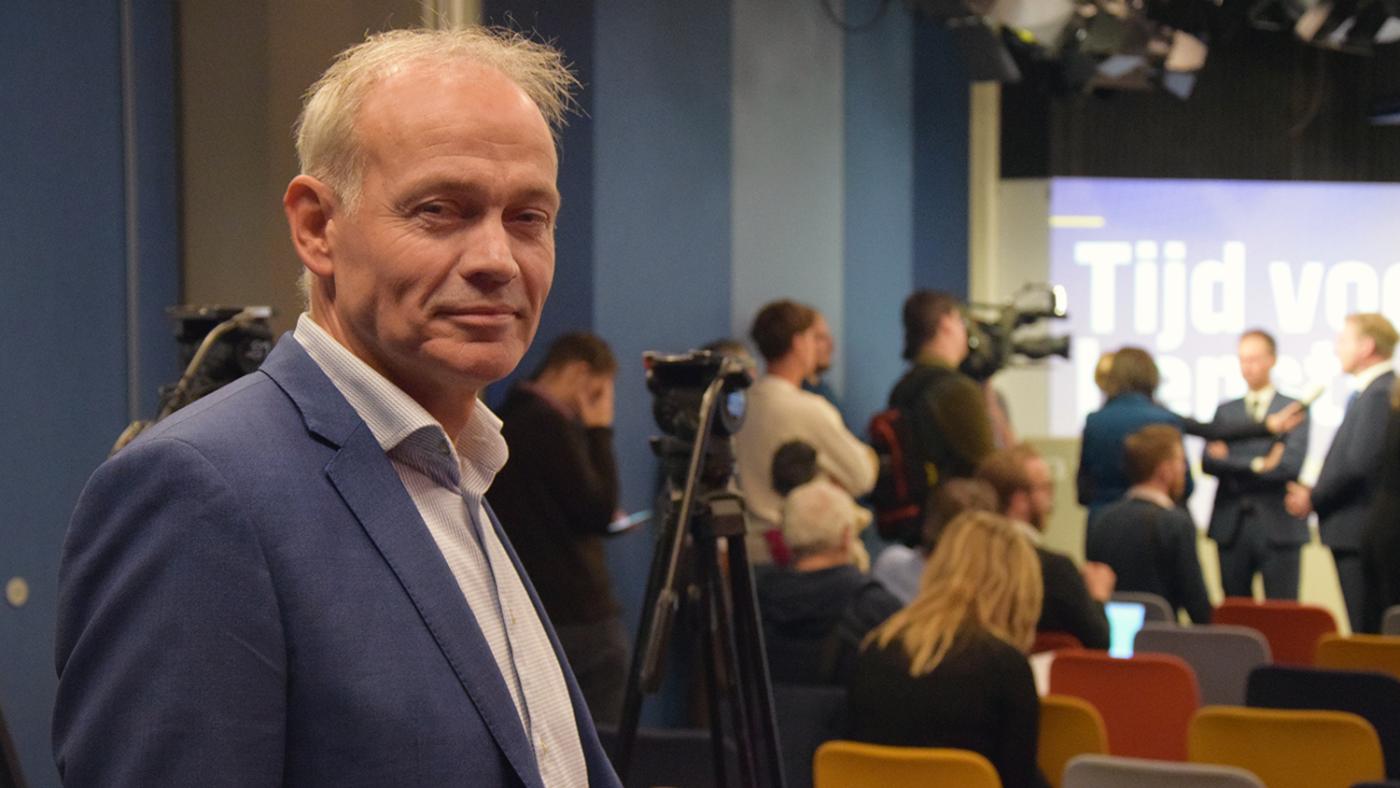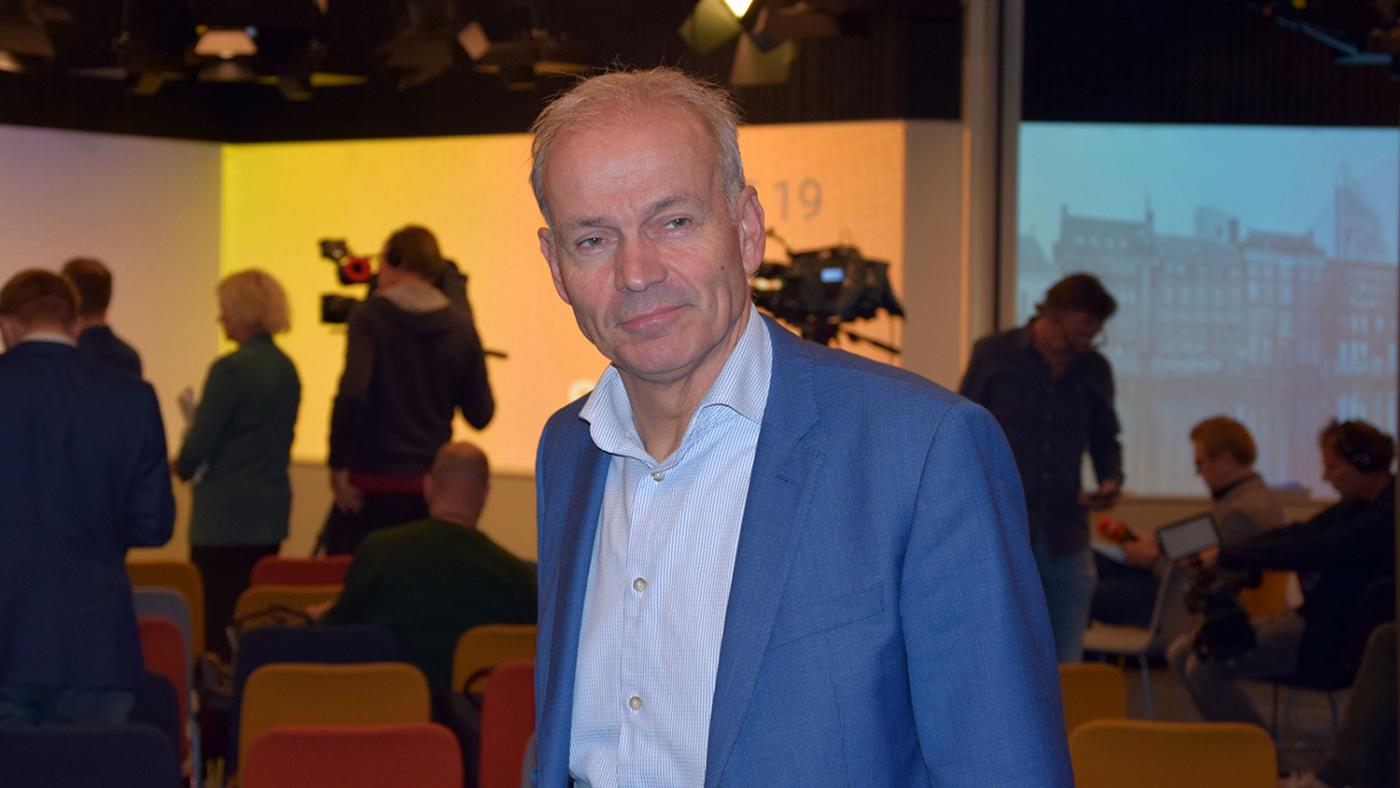Ludo Koks is UU's public affairs advisor
‘Our man in The Hague’ lobbies for good causes

The interview with Ludo Koks coincides with the presentation of Pieter Omtzigt’s party manifesto. The UU public affairs advisor listens carefully while waiting for DUB's journalist to arrive, as he is interested in everything that happens in The Hague.
“Hey Ludo, are you going to work for New Social Contract [Omtzigt’s new party, Ed.]?” another public affairs advisor laughs. You have to be careful in these hallways as gossip and rumours spread before you know it. The two colleagues then have a quick chat about which parliament members they feel contribute the most to debates, and about how some people are still ignorant about political processes within their respective organisations. After that, Koks is asked whether he can raise awareness of one of UU's research projects in The Hague the next day. This is something he has to do while dealing with complicated processes and relations, and everything in politics is about timing. “I heard a great quote about this when I was a student in public affairs. If you’re too early, you’re too early, you're too early, you're too late.”
It’s like the stock market. Most people would associate lobbying with advocacy and big industries such as tobacco, farmers, and construction. “In addition, my profession comes with a connotation that isn’t always positive for some people. They assume that we spend our time in back rooms trying to push our own interests through. But, in my case, I'm trying to teach politicians and civil servants about things they might not know about yet. That’s something completely different. I’m really a lobbyist for good causes.”
A motion about lab animals
Ludo Koks has been working in this position for a few years. Prior to this role, he worked for UU's communications department and served as a spokesperson for the former Executive Board chair Yvonne van Rooij, who had a lot of political connections. “I’ve always been interested in other people’s points of view,” says Koks. His role basically exists because universities are interested in showing their value. Scientific research should be taken into account when deciding financing matters or to combat the oft-repeated idea that "science is just an opinion." But that's not all: universities are taking their own societal roles more seriously now.
He is not the only one representing a university in The Hague. Almost all universities have their own public affairs advisors these days. “The umbrella organisation Universities of the Netherlands (UNL) has been here for longer, and they advocate for the interests of the sector,” Koks explains. “But it’s also pretty useful to show to The Hague what a particular university produces in terms of knowledge and expertise. An umbrella organisation can’t always do that. We’re a broad university, there is a bit of everything at UU. The trick is to establish a connection between political researchers and decision-makers when in debates like the one about the climate and energy.”
He’s not the only link between Utrecht and The Hague, though. There are plenty of ties between the university and MPs but, by staying close to the fire, Koks can spot opportunities and make connections at the right times. “I'll give you an example: how should you interpret the data about nitrogen and particulate matter? So, we invite members of parliament to ensure that they are knowledgeable when engaging in debates about this topic. We’re also active when it comes to innovations in the field of animal-free testing. Lab animals are still the standard in Dutch legislation. As a university, we can show that it is possible to develop medication without animal testing by using mini organs, for instance. Partially thanks to the information that we provided, a motion was accepted for the registration of all individual animal tests. That matters because it means no unnecessary double tests will be conducted anymore.”
What Koks likes the most about his job is contributing to long-term issues. That’s when he feels his work really has an impact. But he’s also involved with more specific subjects. For example, he helped scientist Hille Fieten highlight the breeding of short-snouted dogs, which led to questions in Parliament and new regulation.

Working together
Ludo Koks knows many ways to bridge the distance between The Hague and Utrecht University. This can be done, for example, through the so-called Round Tables: conversations between MPs and experts on topics like air quality, environmental law, odour problems and global food issues. UU experts take part in these meetings. He also makes sure there are regional network meetings connecting politicians, political staff, and civil servants to large Utrecht-based employers.
Connecting people and making them work together —that’s the core of Koks' job. The fact that there are other lobbyists representing other universities as well, does not mean there is any competition going on. “Does it matter that sometimes it’s a UU study that contributes to a motion and, the next day, it's a study from Wageningen University? It’s important that we, public affairs advisors for universities, express the same message, which is why we often meet to discuss what we want to accomplish together. For instance, we would like to have instruments to help us regulate the influx of international students, as well as a vision of housing construction because we don’t want to end up in a perverse situation where we’re interesting to foreign students but then have to tell them that they can’t live here because there are not enough houses."
Collaborating will remain important in the near future. Ludo Koks is already scheduling political visits after the election. “It can be really interesting for ministers and MPs to schedule multiple visits in Utrecht.” That's why he's meeting with the Utrecht Economic Board and with UMC Utrecht, so he can coordinate a joint visit. After all, November 22 is right around the corner, and more than a hundred new members of Parliament will start working after that. This will be a time of many goodbyes and introductions for Koks, which will lead to new connections, and new opportunities to supply MPs with the right information at the right time.
In the meantime, he's been pondering how to transfer his knowledge about The Hague to his colleagues at UU. That doesn’t require a Public Affairs department, but he hopes that UU and politicians in The Hague know where to find one another, partially thanks to his work. “Recently, Utrecht University was mentioned in a parliamentary letter that contained examples of innovative science communication. That’s great to see. And it’s very satisfying when I see a member of Parliament ask questions based on the right information that we provided them with. Yes, I will always be passionate about creating connections outside the walls of the university and being of political importance. I find it meaningful and fascinating.”